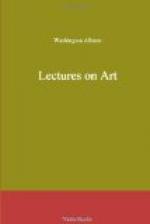Nor does it in any wise affect the essential nature of the Principle in question, or that of the other Characteristics, that the effect which follows is not always of a pleasurable kind; it may even be disagreeable. What we contend for is simply its reality; the character of the perception, like that of every other truth, depending on the individual character of the percipient. The common truth of existence in a living person, for instance, may be to us either a matter of interest or indifference, nay, even of disgust. So also may it be with what is true in Art. Temperament, ignorance, cultivation, vulgarity, and refinement have all, in a greater or less degree, an influence in our impressions; so that any reality may be to us either an offence or a pleasure, yet still a reality. In Art, as in Nature, the True is imperative, and must be felt, even where a timid, a proud, or a selfish motive refuses to acknowledge it.
These last remarks very naturally lead us to another subject, and one of no minor importance; we mean, the education of an Artist; on this, however, we shall at present add but a few words. We use the word education in its widest sense, as involving not only the growth and expansion of the intellect, but a corresponding developement of the moral being; for the wisdom of the intellect is of little worth, if it be not in harmony with the higher spiritual truth. Nor will a moderate, incidental cultivation suffice to him who would become a great Artist. He must sound no less than the full depths of his being ere he is fitted for his calling; a calling in its very condition lofty, demanding an agent by whom, from the actual, living world, is to be wrought an imagined consistent world of Art,—not fantastic, or objectless, but having a purpose, and that purpose, in all its figments, a distinct relation to man’s nature, and all that pertains to it, from the humblest emotion to the highest aspiration; the circle that bounds it being that only which bounds his spirit,—even the confines of that higher world, where ideal glimpses of angelic forms are sometimes permitted to his sublimated vision. Art may, in truth, be called the human world; for it is so far the work of man, that




